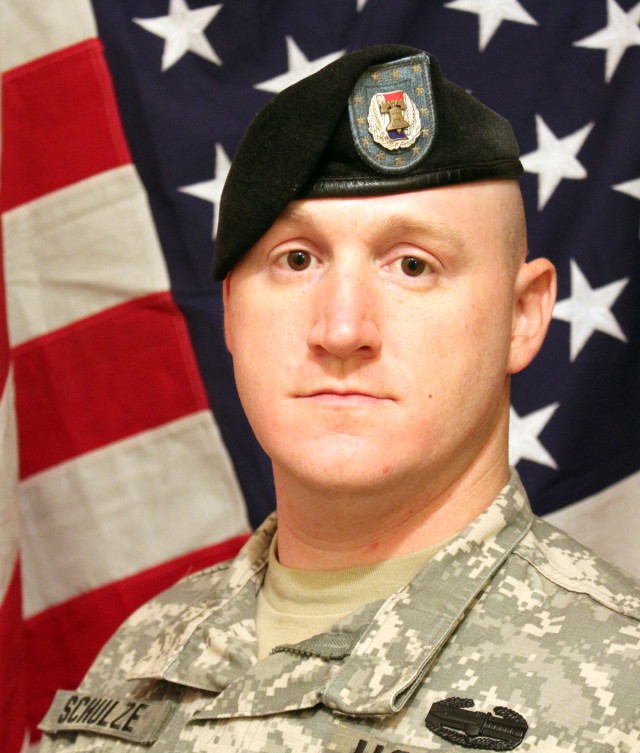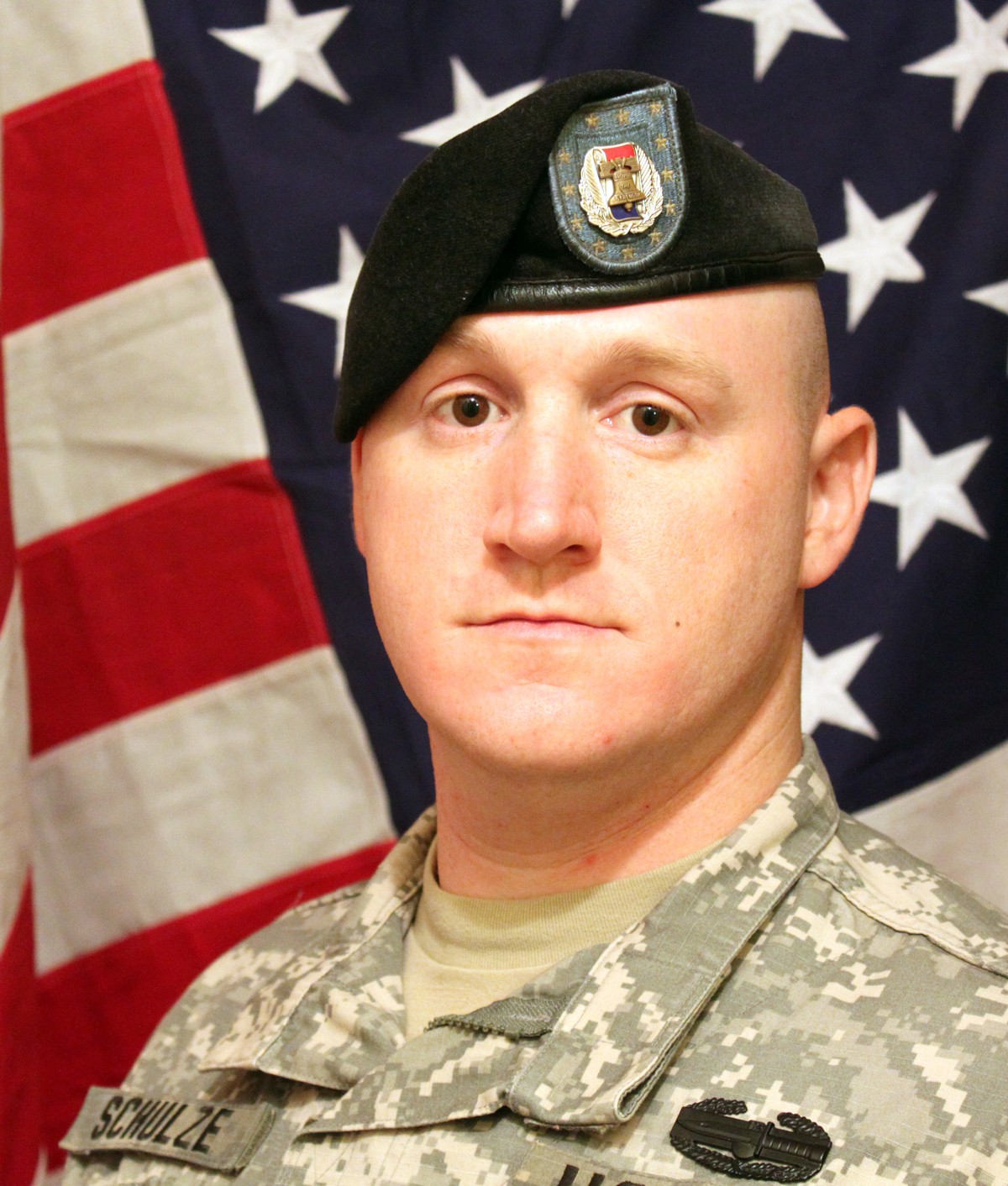James Schulze, a decorated tank commander who routinely came under fire in Iraq, wasn't sure about remaining in the Army or tackling a recruiting assignment. But when he made the transition, something amazing happened - he re-energized his Army career!
Consider two different assignments, neither of them easy. One places you in greater harm's way; the other involves public speaking.
The first assignment puts you in command of a tank crew on patrol in Iraq alongside other tank crews hunting down insurgents.
Fast forward to the second assignment. You're sweating profusely. Your heart is pounding, and your hands are shaking. There you are, standing at the front of a classroom in Killeen, Texas, for your first-ever public speaking engagement. Staring back at you are 30 high-school students armed, not with AK-47 rifles and explosives, but with cell phones with full Internet and text-messaging capability. For all you know, these kids have just about zero interest in anything you might have to say. Dodging mortar fire, you think, has to be a lot easier than this.
Welcome to Staff Sgt. James Schulze's world.
Schulze was an armor crewmember and tank commander for six years. During a one-year tour in Iraq, Schulze participated in many reconnaissance missions. As they approached a town, tank crews often came under heavy mortar and sniper fire. Schulze remembers being fired on a dozen or more times. His actions during one such engagement earned him an Army commendation.
As he finished his combat tour, Schulze learned his next assignment would take him to Texas as a member of the U.S. Army Recruiting Command (USAREC).
"I was apprehensive about it," Schulze said. "I had heard things about recruiting that were not positive, and I was worried about making the transition. I mean, I'm going from being shot at to something completely different."
An Army debriefing-standard procedure-helped him begin to make the transition. So did the training he received at the Recruiting and Retention School in South Carolina. Still, the transition wasn't easy.
During one of Schulze's early school visits, a teenager refused to accept the recruiter's business card and expressed contempt for the Army.
"It was the toughest, most difficult (job) transition I've ever been through," said Schulze. "In Iraq, there's this camaraderie you develop when you believe in the Army, the people with you believe in the Army, and you put your lives in each other's hands.
"You go from that camaraderie to encountering someone with a completely different viewpoint," Schulze added. "It took some getting used to."
Before he became a recruiter, he had heard that recruiting involved long hours and a lot of stress. Two things would prove helpful in making the job easier and less stressful.
First, Schulze credits his training and the many hours he's spent practicing his recruiting skills. Second, the USAREC commanding general in May issued a policy that ends the recruiter's normal duty day at 1700 Monday through Friday. The policy has resulted in a predictable work schedule for recruiters and reduced stress levels.
Schulze said he has always been an outgoing person with a healthy sense of humor. He said he'd never been afraid to approach and talk to teenagers. Public speaking was another matter.
Four years into his recruiting tour, he laughs at himself as he remembers all the preparation-the repeated rehearsals first in front of his wife, and then in front of family and friends. The practicing built his confidence. So did the weekly training sessions at the Killeen Recruiting Station.
Schulze hit some bumps along the way, but he grew comfortable in the job and loved the benefits. While a normal tour of duty in recruiting is three years, Schulze decided to extend that tour by one year to give himself more time to decide his future.
The Soldier had come back from Iraq convinced that he would not re-enlist. His Army career would end after he completed the recruiting assignment. But the recruiting position opened his eyes to other possibilities as he learned more about all the careers available in the Army.
Schulze met a retired military intelligence officer who shared details about intelligence work, something that intrigued Schulze. As a result, Schulze applied for and was accepted into military intelligence training, which will start in early November.
"I credit my time in recruiting for getting me excited about the Army again and showing me all the different career opportunities there are," Schulze said. "Doing this job helped me realize that I want to be in the Army for life."
His time in recruiting is ending with more predictable work hours, something he treasures, especially now. His wife is expecting the couple's first child in August. There's been a promotion and an increase in pay, too, something any family man would appreciate.
One key thing Schulze has learned is that young people crave structure and discipline in their lives, even when they don't like it. That's a lesson any soon-to-be, first-time parent can use.
His recruiting philosophy is to be open, honest and forthright with recruits, giving them as much information as he possibly can about what to expect. In fact, Army recruits have the benefit of learning about every aspect of basic training beforehand.
As a way to keep in touch, Schulze has his recruits write him two letters, one before and another immediately after they complete basic training. He also asks for a phone call after their "gas chamber" training.
"It's a room filled with tear gas and it's all about trusting your proper procedures to get through it," he said. "It is not a pleasant experience."
By July 2009, Schulze had already recruited 137 people, with three months left in his four-year assignment.
He believes recruiting raised his profile within the Army. He has learned how to network and build a rapport with people. He will emerge from his recruiting position more confident, goal-oriented and with new communications skills. He is no longer nervous about giving presentations to groups.
Schulze is asked about the most rewarding part of the job.
"I'm going to be in the Army for a long time," the 29-year-old Schulze said. "So I hope to run into a lot of the Soldiers I've recruited down the road, in different parts of the world. And when I see them again, I'd like to hear that the Army has made a big difference in their lives.
"That would be very rewarding to me!"


Social Sharing